Charlie Chaplin Charlie Chaplin (1889-1977), English motion-picture actor, director, producer, and composer, one of the most creative artists in film history, who first achieved worldwide fame through his performances in silent films.
Publié le 12/05/2013

Extrait du document

Charlie Chaplin Charlie Chaplin (1889-1977), English motion-picture actor, director, producer, and composer, one of the most creative artists in film history, who first achieved worldwide fame through his performances in silent films. His full name was Sir Charles Spencer Chaplin. Born in London, as a child Chaplin appeared in music hall and pantomime performances. In 1910 he toured the United States with a pantomime troupe and decided to remain in the country. Chaplin first appeared on the screen in 1914 with the Keystone Film Company of American director Mack Sennett. In Kid Auto Races at Venice (1914), wearing baggy pants, enormous shoes, and a bowler hat and carrying a bamboo cane, he originated his world-famous character, the Tramp. He played this classic role in more than 70 films during his career. He was associated later with the Essanay Film Company, the Mutual Film Company, and the First National Film Company. In 1918 his own studio in Hollywood, California, was completed. During these years Chaplin gradually developed the tramp character from a jaunty, slapstick stereotype into the compassionate human figure that came to be loved by audiences throughout the world. In 1919 he helped found the United Artists Corporation, with which he was associated until 1952. Important pictures Chaplin produced, directed, and starred in include The Kid (1921), The Pilgrim (1923), The Gold Rush (1925), The Circus (1928), City Lights (1931), Modern Times (1936), The Great Dictator (1940), Monsieur Verdoux (1947), Limelight (1952), and A King in New York (1957). Chaplin wrote, directed, and played in A Countess from Hong Kong (1967). He also composed background music for most of his films. In the late 1940s and early 1950s Chaplin was criticized for his leftist political views. As a result, he left the United States in 1952 and established permanent residence in Switzerland. In 1972 he briefly returned to the United States to receive several tributes, among them a special Academy Award for his contributions to the film industry. He was knighted in 1975. Chaplin perfected an individual style of performing, derived from the circus clown and the mime, combining acrobatic elegance, expressive gesture, facial eloquence, and impeccable timing. His portrayal of the little tramp, a universally recognized symbol of indestructible individuality triumphing over adversity and persecution, both human and mechanical, won him critical renown as a tragicomedian. Film sound recording in the late 1920s, however, imperiled the effectiveness of the pantomime on which much of his creative imagination depended; also, he became concerned with themes of contemporary significance. In his first two films of the sound era, City Lights and Modern Times, Chaplin's little tramp remained silent. Subsequently, he abandoned the role of the tramp and relied upon specific character portrayal. The Great Dictator, which uses all the resources of sound recording, marks this transition. Chaplin's treatment of his subjects compounds satire and pathos, revealing a love of humanity and of individual freedom. He wrote My Autobiography (1964; reprinted as My Early Years,1982) and My Life in Movies (1975). Sir Richard Attenborough's biographical film Chaplin appeared in 1992. Microsoft ® Encarta ® 2009. © 1993-2008 Microsoft Corporation. All rights reserved.
Liens utiles
- John Huston John Huston (1906-1987), American motion-picture director and actor, who created some of the most critically acclaimed films of American cinema in his long and distinguished career.
- Frank Sinatra Frank Sinatra (1915-1998), Italian American singer and motion-picture actor, one of the most famous American entertainers of his generation.
- Akira Kurosawa Akira Kurosawa (1910-1998), Japanese motion-picture director, known worldwide for the variety and visual beauty of his films.
- Shirley Temple Shirley Temple, born in 1928, American motion-picture actor, considered one of the most successful child stars in the history of film.
- Orson Welles Orson Welles (1915-1985), American actor, producer, director, and writer, most noted for directing and starring in the landmark motion picture Citizen Kane (1941).




